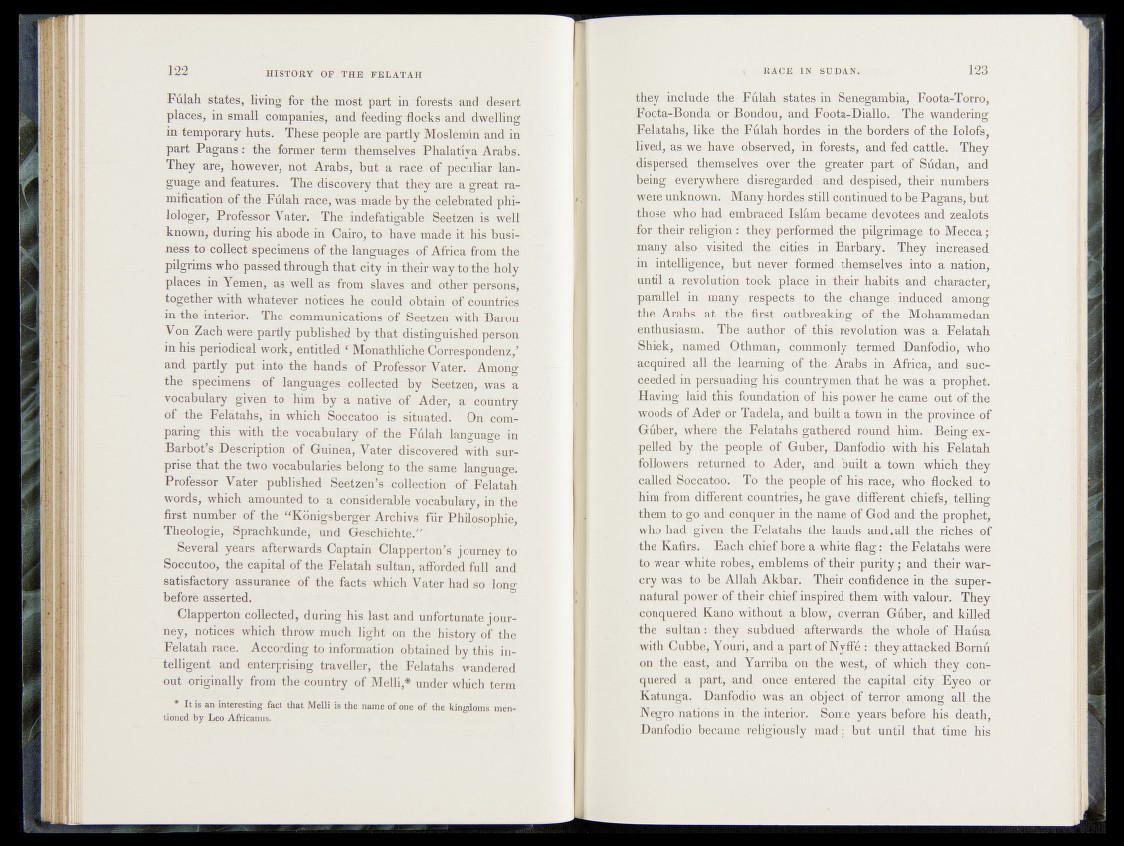
Eujah states, living for the most part in forests and desert
places, in small companies,, and feeding flocks and dwelling
in temporary huts. These people are partly Moslèmin and in
part Pagans: the former term themselves Phalatiya Arabs.
They are, however, not Arabs, but a race of peculiar language
and features. The discovery that they are a great ramification
of the Fulah race, was made by the celebrated phi—
lologer, Professor Vater, The indefatigable Sèétzen is well
known, during his abode in Cairo, to have made it his business
to collect specimens of the languages of Africa from the
pilgrims who passed through that city in their way to the holy
places in Yemen, as well as from slaves and other persons,
together with whatever notices he could obtain of countries
in the interior. The communications of Seetzen with Baron
Von Zach were partly published by that distinguished person
in his periodical work, entitled 1 Monathliche Correspondenz,’
and partly put into the hands of Professor Vater. Among
the specimens of languages collected by Seetzen,^wais a
vocabulary given to him by a native of Ader, a country
of the Felatahs, in which Soccatoo is situated. On comparing
this with the vocabulary of the Fólah language - in
Barbot’s Description of Guinea, Vater discovered with surprise
that the two vocabularies belong to the same-language.
Professor Vater published Seetzen’s collection of Felatah
words, which amounted to a considerable vocabulary, in thé
first number of the “Königsberger Archivs fur Philosophic,
Theologie, Sprachkunde, und Geschichte.”
Several years afterwards Captain Clapperton’s journey to
Soceutoo, the capital of the Felatah sultan, afforded full and
satisfactory assurance of the facts which Vater had so long
before asserted.
Clapperton collected, during his last and unfortunate journey,
notices which throw much light on the history of the
Felatah race. According to information obtained by this intelligent
and enterprising traveller, the Felatahs wandered
out originally from the country of Melli* under which term
* It is an interesting fact that Melli is the name of one of the kingdoms mentioned.
by Leo Africanus.
they include the Ftilah states in Senegambia, Foota-Torro,
Foota-Bonda or Bondou, and Foota-Diallo. The wandering
Felatahs, like the'Fülah hordes in the'borders of the Iolofs,
lived, as we have observed, in forests, and fed cattle. They
dispersed themselves over the greater part of Sudan, and
being everywhere ^ disregarded^. and despised, their numbers
were unknown. Many hordes,still> continued' to be Pagans, but
.thpse, who had embraced Islam became, devotees and zealots
for their religion : they performed the pilgrimage to Mecca;
many also visited the .cities in Barbary. They increased
in intelligence, but never formed -themselves into a nation,
until a revolution took place in their habits, and character,
parallel in many respects to the change induced among
the Arabs at the; first outbreaking of- the Mohammedan
enthusiasm. The author of this revolution was a Felatah
Shiek, named Othmany, Cpmmonly termed Danfodio, who
acquired all thé learning of the Arabs - in Africa, and, succeeded
in persuading his countrymen that he was a prophet.
Having laid this foundation of his power he came out of the
.woods of Ader or Tadela, and built a town in the . province of
Guber, where the Felatahs gathered round him.; Being expelled
by the people of Guber, Danfodio with his Felatah
«followers returned to Ader* and built a town which they
called Soccatoo. To the people of his race, who flocked to
him from different countries, he; gave diflerent chiefs, telling
them to go and conquer in. the name of God and the prophet,
who had given the Felatahs the lands and.all the riches of
the Kafirs. Each chief bore a white flag: the Felatahs were
to wear white, robes, emblems of their purity; and thei r war-
cry was to be Allah Akbar. Their confidence in the supernatural
power of their chief inspired them with valour. They
conquered Kano without a blow*) overran. Guber, and killed
the sultan: they subdued afterwards the whole of Ilausa
with Cubbe, Youri, and a part of Nyffé : they attacked Bornu
on the east, and Yarriba on the west, of which they conquered
a part, and once entered the capital city Eyeo - or
Katünga. Danfodio was an object of terror, among all the
Negro nations in the interior. Some years before his death,
Danfodio became religiously mad; but until that time his